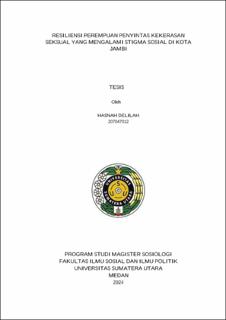Resiliensi Perempuan Penyintas Kekerasan Seksual yang Mengalami Stigma Sosial di Kota Jambi
Resilience of Female Survivors of Sexual Violence Who Experience Social Stigma in Jambi City

Date
2024Author
Delilah, Hasnah
Advisor(s)
Daulay, Harmona
Munthe, Hadriana Marhaeni
Metadata
Show full item recordAbstract
Female survivors of violence still face social stigma from society. This stigma is often directed towards women as victims rather than towards men as perpetrators. Female survivors of sexsual violence not only exhibit passive behaviour and surrender easily but also demonstrate resilience to overcome their challenges. This research aims to understand the resilience of female survivors of sexsual violence who experience social stigma and their efforts to overcome violence in the city of jambi. This research uses as qualitative approach. The result show that female survivors of sexual violence experience stigma in the form of stereotypes, labelling, and discrimination from society. This study utilizes stigma from Erving Goffman’s perpective, which views attributes that deeply discredit someone, evident in both verbal and non verbal language in everyday relationship. The social stigma received by victims is due to several factors, including societal perceptions of women and patriarchal culture. This social stigma leads victim to be perceived negatively by society. Female survivors of sexual violence experiencing social stigma exhibit resilience due to the stigma imposed by society and make effort to overcome the violence they have experienced, in order to recover and rise from their past traumas. Resilience is achieved throught seven basic abilities from revich’s theory: first, emotional regulation, enabling informants to control themselves and their emotions from society’s negative comments. Second, is impulse control, such as controlling fear and traumatize. Third, optimism is demonstrated by informants as they strive to continue their live by working and studying. Fourth, problem-solving analysis reveals that violence and stigma are unintentional and driven by perpetrators, and stigma arises from society’s negative perceptions. Fifth, empathy in addressing problems; sixth, self-efficacy, is manifested in various ways such as striving to rise being cautious, and restricting social media accounts. Seventh, reaching out, implemented by informants in applying resilience.
Collections
- Master Theses [73]
